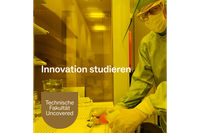Prof. Alwin Daus in interview
In our series "Technische Fakultät Uncovered", we introduce a professor of the Faculty of Engineering of the University of Freiburg every week. The professors provide exciting insights into their work as scientists and teachers and even reveal one or two secrets about themselves.
Prof. Alwin Daus is professor at the Department of Microsystems Engineering and head of the Sensors laboratory. He has filled out the questionnaire for us.
- What do you associate with microsystems engineering?
Microsystems engineering is a broad field encompassing basic research and applications in the field of micro- and nanotechnology. This includes research on materials, micro/nanostructuring processes, devices as well as microsystems and their use in a wide range of applications. Applications range from electronics and sensor technology in cars, cell phones or other electronic components to environmental sensors, biomedical technology and electromobility.
- What is your main field of research and why is it so exciting for you?
My main research areas are electronic nanomaterials, their deposition and growth, and their implementation in functional devices. In terms of devices, I cover a broad spectrum ranging from sensors in various forms to electronic devices (transistors as switching elements, and memories) and energy harvesting in the form of solar cells.
I am particularly excited about the field of two-dimensional materials, where we work on processes grow semiconductor thin-films with a thickness of single crystalline layers. For example, it is possible to make such materials with a thickness of 1-3 atoms, 100‘000 times thinner than a human hair. These materials have many special properties that make them interesting for research on the abovementioned devices and applications.
- What do the students learn from you and which aspects are particularly important to you?
I teach students the fundamentals of electronic materials and their application in devices. Since this is a broad spectrum, it is important to me that students understand the physical and chemical principles required for material growth as well as for the function of a material in a device. Beyond that, however, I focus on an experimental, hands-on engineering approach that focuses on performance parameters and prospects for application. It is important to me to always question results and literature critically, as this is an interdisciplinary field and researchers do not always cover the expertise of all subfields. It is important to me to teach students this critical thinking.
- What advice would you give to students at the beginning of their studies?
Be open to different areas of specialization and use the beginning as an orientation to find your favorite study fields. Also, don't be put off by some of the "dry" basics. It is important to lay a good foundation, but as you progress, you will be able to go into more detail and choose specializations based on your own interests.
In addition, university is different from high school. More independence and personal responsibility is required. You decide how best to prepare for exams. Of course, the university staff is available to help with questions and problems, but the study program is designed to teach self-reliance. If in the first semester the results do not quite match your wishes, ideas or what you are used to from your high school days, do not let this impress you. You will see that you will quickly get used to this new form of education and learn to appreciate it.
- What are the career prospects for graduates?
The career prospects are excellent. There are many companies looking for microsystems engineers. However, due to this specific subject and at the same time broad field of application, you are very well equipped to tackle various tasks after graduation.
Especially in the field of microelectronics, there are currently many investments and initiatives worldwide, which are due to the political situation between Taiwan, China and the USA. Therefore, there are so-called Chips Acts, where billions are being invested in semiconductor technology. Microsystems engineers are also very welcome there, which shows that the field is not only promising, but also of political and societal importance. There are also many opportunities to enter research and development or to start your own company after graduation. All paths are open!
- What is your motto for teaching and research?
Generate curiosity, question critically, analyze and discuss thoroughly, and enjoy acquiring knowledge.
- What do you like best about the Faculty of Engineering?
The large number of colleagues with different research backgrounds, which allows a high degree of interdisciplinarity.
- What you think students should know about you?
In my professional career, I have held a variety of positions and got around a lot. After conducting research at universities and in industry in various locations in Germany, Switzerland, and on the east and west coasts of the US, I am now happy to be here in Freiburg. I think that the high quality of teaching and research along with an unbeatable city and region is something I can recommend to everyone!
Contact:
Prof. Alwin Daus
University of Freiburg
Department of Microsystems Engineering – IMTEK
Sensors Laboratory
E-Mail: alwin.daus@imtek.uni-freiburg.de
Kerstin Steiger-Merx
Representative PR/Marketing
Faculty of Engineering
University of Freiburg
Tel.: 0761/203-8056
E-Mail: steiger-merx@tf.uni-freiburg.de

